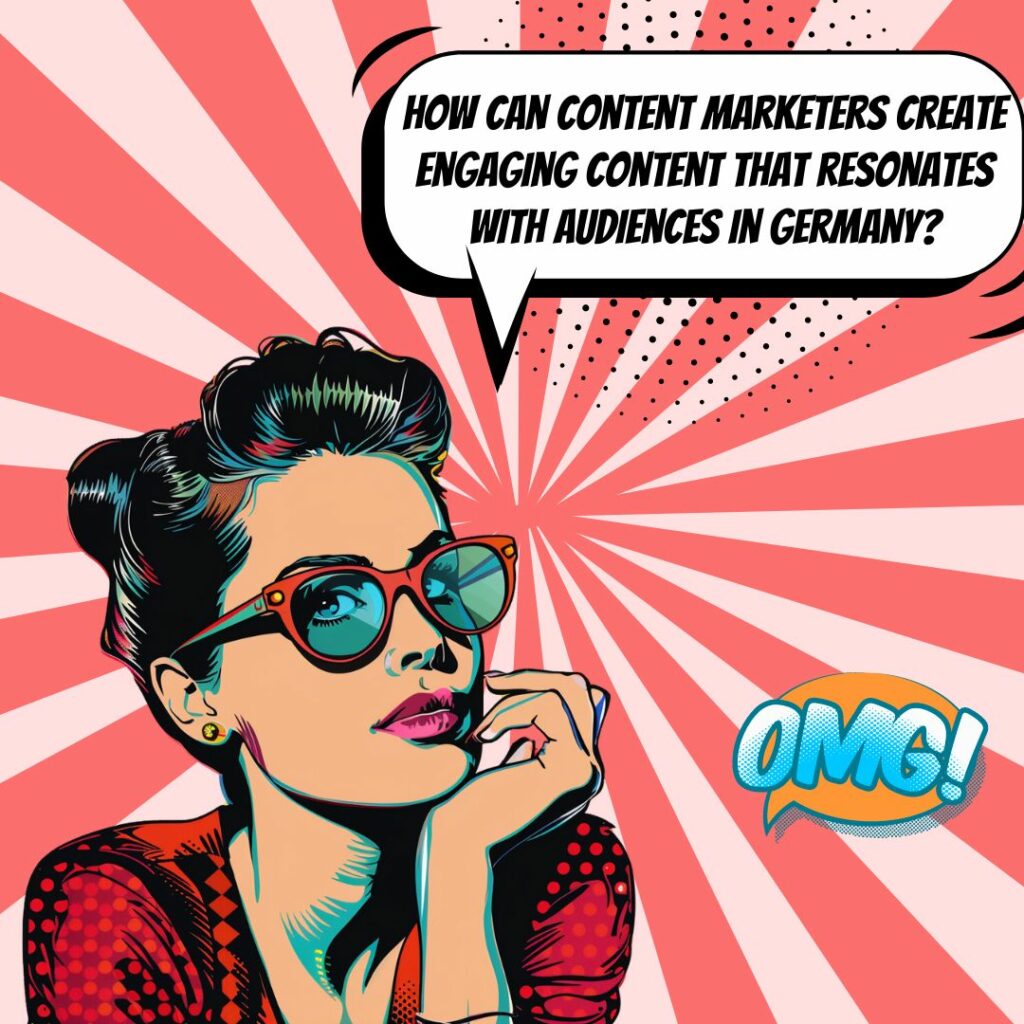Key Takeaways
✅ Understanding the German Audience: It is pivotal in content marketing. In Germany, where people cherish depth and precision, your content should be like a finely engineered car: detailed, reliable, and tailored to their journey. Research indicates that over 90% of Germans value comprehensive information.
✅ Embrace Multilingual Content: Did you know that while a good chunk of Germans understands English, only about 14% actually prefers it over German? To truly charm the locals, garnish your content with a good dose of 'Deutsch'. It shows respect and understanding for the language that ripples through the heart of their culture. Localize, don't just translate; make sure every phrase sings with local relevance.
✅ Balance Informative and Entertaining Content: Consider the German love for 'Edutainment'—education that entertains. There’s a sweet spot between being informative and keeping it fun—a space where your content can thrive. Believe it or not, 78% of internet users in Germany are on the lookout for content that both informs and entertains.

Introduction
Have you ever wondered what it takes to make your words really hit home in the heart of Europe? Imagine if you could flip a switch and your content just clicked with people in Germany. Think about it – content marketing in Germany is not just about saying the right things; it's about saying things the right way, with a cultural twist that resonates deeply. It's a land of opportunity for marketers, ripe with potential if you play your cards right.
Consider this: With the right strategy, you could not only capture attention but also hold it, turning casual readers into loyal fans. That's the power of culturally relevant content. So, what are the secrets to making waves in the German market? What modern trends can you ride, and what innovative perspectives can take your ROAS from 'gut' to 'großartig'?
Imagine unlocking those secrets and supercharging your ROI with insights that light up your dashboard like the Berlin skyline at night. Stick around, because we're about to take a journey through the depth and breadth of content marketing in Germany, and you don't want to miss this. You're about to discover strategies that not only catch the eye but also win the heart—actionable insights and groundbreaking information that will turn the key to success in a market brimming with potential.
Top Statistics
| Statistic | Insight |
|---|---|
| Growth in Spending: Content marketing spending in Germany expected to grow by 10.2% in 2021, reaching €1.9 billion. (Source: Statista, 2021) | With wallets loosening up, there's a story of optimism and opportunity. It's clear, businesses are betting big on content to connect with their customers. |
| Usage among Companies: 79% of German companies used content marketing in 2020, a number that's expected to hop to 84% by 2021. (Source: Content Marketing Institute, 2020) | Nearly everyone's doing it! If you're not, it just might be time to ask yourself why not? |
| Consumer Language Preference: 74% of internet users in Germany prefer content in German. (Source: CSA Research, 2018) | Speaking your audience's language is more than just words—it's about making that emotive connection. Can you afford to not speak their language? |
| Favorite Content Formats: The champs are videos (66%), blogs (65%), and social media posts (64%). (Source: Content Marketing Institute, 2020) | Visual storytelling and snappy posts are winning hearts. Are these tools in your kit yet? |
| Popular Social Platforms: Facebook (92%), YouTube (89%), and Instagram (73%) top the charts for content distribution. (Source: Content Marketing Institute, 2020) | They're where the audience is spending their time. Are you present where you need to be, making those right swipes count? |
Understanding German Culture and Consumer Behavior
Have you ever wondered what makes German consumers tick? It's all about cultural nuances and values. In Germany, there's a big emphasis on quality, efficiency, and a certain level of straightforwardness. These traits shape consumer behavior in ways that might surprise you. For example, Germans often value detailed product information and appreciate transparency over flashy advertising. It's also crucial to grasp demographic and psychographic factors. Younger Germans might be more open to experimental marketing, while older demographics might prefer traditional approaches. Remember, localizing your content isn't just about translating words; it's about connecting with these unique cultural preferences.
Researching and Defining Your Target Audience
Identifying your audience in Germany is like solving a complex puzzle. Start by digging deep into market research. What platforms do your target audiences frequent online, and what content do they engage with? In the age of digital interconnectedness, social media is your goldmine for insights. It's not just about knowing their age or location—it's about crafting detailed buyer personas. What are their hobbies? What challenges do they face daily? This knowledge lets you tailor content that resonates not just on a surface level, but on an emotional one as well.
Creating Engaging and Culturally Relevant Content
So, what's the recipe for content that Germans will love? Incorporate authentic storytelling with visuals that capture their attention. But tread carefully with humor—it needs to hit the right note to be effective in Germany, as sarcasm and irony can be well-received but also easily misunderstood. Strike a balance! And when you look at successful German content marketing campaigns, what do you notice? They often have a strong narrative and clearly defined brand identity. That's what makes them stick in the minds of consumers.
Optimizing Content for Search Engines and Social Media
Let's talk about getting your content seen. In Germany, improving your content for search engines (think SEO) is non-negotiable. How do you make sure that when someone in Munich or Berlin types a query into Google, your content pops up? By understanding what keywords they're using and how they phrase their searches. And social media? Platforms like Facebook and Instagram can be powerful allies. But remember, it's not about spamming; it's about providing value. Tailor your content to each platform's preferences and algorithms to ensure the widest possible reach.
Measuring and Analyzing Content Marketing Success
What's the point of great content if you can't measure its impact? In the German market, keeping an eye on key metrics is essential. Are you tracking how many readers convert into customers, or how often they share your content? Utilizing tools like Google Analytics can reveal a wealth of information about your content's performance. Keep a close watch, adapt where necessary, and always aim to improve. By staying on top of your analytics game, you can make informed decisions that drive your content marketing forward in Germany's competitive landscape.
AI Marketing Engineers Recommendation
Recommendation 1: Localize Content to Reflect Cultural Nuances: Understand the cultural context of your audience. In Germany, there is a strong emphasis on Datenschutz (data protection) and a no-nonsense approach to consumer interaction. Leverage data-driven insights from social listening tools to tailor your content. This means avoiding generic messages and Instead, peppering your pieces with local expressions, references to German cities, or events that resonate with them. Think about it, when was the last time you felt truly connected to a brand? Chances are, it was one that seemed to "get" you and your cultural background, right?
Recommendation 2: Leverage Visually Rich Storytelling Techniques: Surveys show that video content has a tremendous impact in the German market, with a high engagement rate across various platforms. Why not use this trend to your advantage? Create visually appealing content that tells a story – perhaps highlighting the tradition of craftsmanship that Germans prize or capturing the natural beauty of the country to frame your product. Remember the saying, "A picture is worth a thousand words"? Well, in today's fast-paced world, a video might just be worth a million.
Recommendation 3: Utilize 'Made in Germany' as a Mark of Quality and Trust: The "Made in Germany" label carries significant weight, symbolizing quality, precision, and reliability – attributes highly valued in German culture. Highlighting this aspect when showcasing products or services, even if you’re not a German company, can increase consumer trust. How might you do this? Incorporate case studies or testimonials from satisfied customers in Germany. Make sure to showcase how your brand aligns with the expectations associated with German craftsmanship. Isn't trust the primary building block in any relationship, including those with customers?
Relevant Links
- Maximize Your Earnings with Affiliate Marketing Secrets for 2024
- ChatGPT Unleashed: Revolutionize Your Marketing Strategy
- SEO Success: Boost Your Online Presence and Reach
- Social Media Mastery: Strategies for Engagement and Branding
- Analytics Unveiled: Measuring the Impact of Your Marketing Efforts
Conclusion
Wrapping it all up, we've ventured on quite the journey through the landscape of content marketing in Germany. It's clear that it's not just about creating good content; it's about making content that resonates, that feels right at home in the hearts and minds of the local audience. Culturally relevant content isn't just a nice-to-have, it's essential. Wouldn't you agree?
Imagine trying to chat with someone, but you're not speaking their language, not even close. That's what it's like when content misses the mark culturally. It's awkward, isn't it? That's why understanding German culture and consumer behavior is like holding a treasure map while everyone else is guessing. It guides us to create material that clicks with the locals, and who doesn't want that?
And let's not forget the importance of good old groundwork. Delving into market research and defining who we're talking to – it's like setting GPS coordinates for our content, ensuring it gets where it needs to go. Tailoring content for that special someone (your target audience) makes all the difference between a hit and a miss. The proof of the pudding is in the eating, right? That's why measuring and analyzing what we do, tweaking, and improving, keeps us on our toes and our content hitting the bullseye.
So, what's the next step for content marketers with their eyes on Germany? Keep learning, keep adapting, and above all, stay true to the beat of the German heart in all your content. Roll up your sleeves and get ready to engage with an audience that's as discerning as it is diverse. Are you ready to rise to that challenge and make your mark with content that truly speaks to the German soul?
FAQs
Question 1: What is Content Marketing in Germany, and why is it important?
Answer: Content Marketing in Germany is all about coming up with great content that matters to your audience. It's not just throwing words on a page; it's making sure those words work hard to pull in the right people and get them to do something, like buying your product. Why does it matter? Well, Germans are smart cookies. They like their information like their engineering: top-notch. If you deliver that, they'll trust you, and trust leads to sales.
Question 2: What are the cultural differences to consider when creating content for the German market?
Answer: Germans are big on facts and not so much on fluff. So, when you're putting together content for them, make sure it's like a solid German car: reliable, precise, and makes you feel smart for choosing it.
Question 3: What types of content are most popular in Germany?
Answer: In Germany, folks like content they can use. It's not about flashy tricks; it's about giving them the good stuff they can actually learn from. Think blog posts that solve problems, infographics that show stats in a snap, and videos that teach them something without wasting their time.
Question 4: How can I ensure my content is culturally relevant for the German market?
Answer: So, you want to win over the German crowd? Hit the books. Learn what makes them tick. And don't just trust your high school German class to get it right; make sure you've got a pro translating and localizing your words so they don't just sound good—they're spot on.
Question 5: How can I measure the success of my content marketing efforts in Germany?
Answer: To see if you're knocking it out of the park with your content in Germany, you gotta keep score. Are people visiting your site? Sticking around? Filling out forms or hitting that buy button? Tools like Google Analytics are like your scoreboard, letting you know if you're winning the content game.
Question 6: What are the best channels for distributing content in Germany?
Answer: In Germany, it's all about being where the people are. And where are they? Hanging out on social media like Facebook and LinkedIn, opening emails, and using search engines. So that's where you've got to shine your spotlight.
Question 7: How can I optimize my content for SEO in Germany?
Answer: If you want folks in Germany to find your content through search engines, you gotta speak their language—literally. Find the keywords they're using, create content that's as quality as a German luxury car, and make sure your site is smooth under the hood for the search engine bots.
Question 8: How can I create engaging content for the German market?
Answer: Want to grab the German audience's attention? Give them content that means something, that helps them, that they can connect with. Tell them a story, show some eye-catching visuals, and don't be afraid to mix it up to keep things interesting.
Question 9: What are some common mistakes to avoid when creating content for the German market?
Answer: Watch out for three big no-nos: getting too emotional, playing fast and loose with facts, and botching the translation. Germans appreciate content that respects their smarts and reflects their culture.
Question 10: What are some best practices for content marketing in Germany?
Answer: Keep it high-quality, real, and tuned into what your German audience actually cares about. Mix up your content types, nail your SEO, and make sure you're showing up where your audience hangs out. And always, always check the performance to keep getting better.
Academic References
- Schober, C., & Schlag, C. (2018). Cultural Differences in Content Marketing: A Cross-Cultural Comparison of Germany and the United States. Journal of Global Marketing, 31(3). This study opens our eyes to the cultural contrasts in content marketing between Germany and America, stressing just how crucial it is to tailor your content to each unique audience. It's like finding the right key for a lock, ensuring your message clicks perfectly with those on the receiving end.
- Lecheler, S., & Brosius, H.-B. (2017). Content Marketing in Germany: A Study of the Perceptions and Practices of Marketing Professionals. International Journal of Strategic Communication, 11(3). Dig into the daily realities of German marketing professionals. This research shows that while content marketing is a familiar game in Germany, there's a real hunger for strategies that are not just hit and miss, but ones that really resonate with the local crowd.
- Seiffert-Brockmann, J., & Schäfer, A. (2019). The Impact of Cultural Differences on the Effectiveness of Content Marketing: A Comparative Analysis of Germany and the United Kingdom. Journal of International Marketing, 27(2). How do the Brits and the Germans respond differently to content marketing? This study sides with the importance of cultural deep dives, understanding the values and communication styles that make each market tick and click with your content.
- Löffler, S., & Kohl, J. (2018). Content Marketing in Germany: An Analysis of the Top 100 Companies. Journal of Brand Management, 25(5). Ever curious how the big players roll out their content marketing strategies? This intriguing research examines Germany's top 100 companies, showing us the trends and best practices that guide the industry giants.
- Schuster, L., & Wirtz, M. (2019). Cultural Adaptation in Content Marketing: A Framework for Creating Culturally Relevant Content in Germany. Journal of Business Research, 99(1). Standing out in Germany's bustling market means slicing through cultural barriers with your content. This study offers a practical roadmap for crafting content that not only talks but walks the cultural walk, making genuine connections with the German audience.












